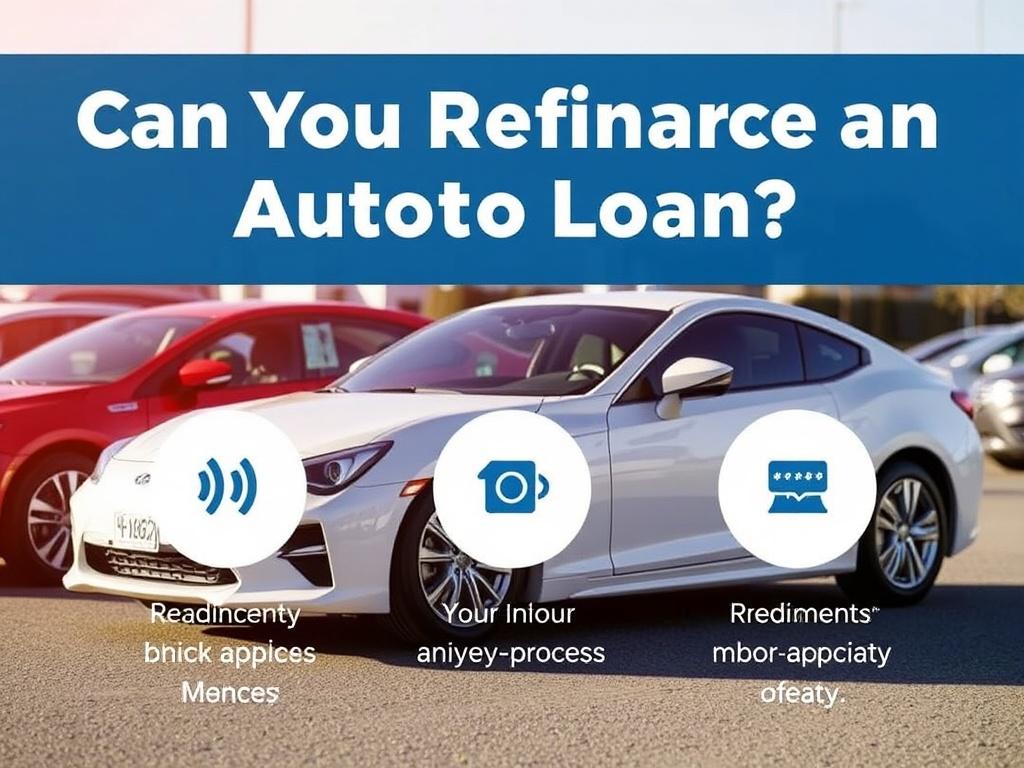SQLITE NOT INSTALLED
Refinancing an auto loan might sound like a financial term reserved only for the experts, but it’s actually a smart option available to many car owners. Whether you’re looking to reduce your monthly payments, lower your interest rate, or change the loan term, refinancing can offer several benefits. But before you dive in, it’s important to understand what refinancing entails, how it works, and whether it’s the right choice for you.
If you’re asking yourself, “can you refinance an auto loan?” the answer is yes, most people can. However, there are some requirements and factors to consider. This article will guide you through the entire process step by step, explaining the pros and cons, how to qualify, and what mistakes to avoid. By the end of this read, you’ll have a clear understanding of refinancing an auto loan and be better prepared to make an informed decision.
Содержание
What Does It Mean to Refinance an Auto Loan?

Refinancing an auto loan essentially means replacing your current car loan with a new one, usually from a different lender. This new loan pays off the old one, and you start making payments to the new lender under new terms. The goal is to get better loan conditions, which can include a lower interest rate, a longer or shorter repayment period, or lower monthly payments.
Think of it like when you refinance a mortgage: you’re not changing the fact that you own the car, but you are changing how you pay for it. Some people refinance to save money overall, while others may want to free up cash flow in the short term.
Why Do People Refinance Their Auto Loans?
There are many reasons why people consider refinancing their auto loan:
- Lower Interest Rates: If your credit score has improved since you took out the original loan or if market rates have dropped, refinancing can help you capitalize on these changes.
- Lower Monthly Payments: Stretching the loan term can reduce your monthly payments, making your budget more manageable.
- Pay Off Your Loan Faster: Conversely, some refinance to shorten their loan term and pay less in interest over the life of the loan.
- Improve Cash Flow: Refinancing can free up monthly cash for other expenses by lowering your payments.
- Change Lender or Loan Terms: A better customer service experience or loan terms can also motivate some to refinance.
Can You Refinance an Auto Loan? The Eligibility Criteria
The big question often is, “Can you refinance an auto loan?” The answer depends on several factors. Lenders typically have criteria you must meet to qualify for refinancing a car loan:
| Eligibility Factor | Details |
|---|---|
| Credit Score | Most lenders require a minimum credit score, often above 600. Higher scores qualify for better rates. |
| Loan to Value (LTV) Ratio | This is the percentage of your car’s value remaining on the loan. Lower LTV ratios increase refinancing chances. |
| Loan Age | Newer loans (usually less than 3-5 years old) have a better chance of being refinanced, especially if the car is still in good condition. |
| Current Loan Details | Lenders will evaluate your remaining principal and existing loan terms to determine refinancing eligibility. |
| Car Condition and Title | Your car must generally be in good shape and have a clear title (not totaled or salvage). |
If you meet these basic criteria, you can probably refinance your auto loan—though every lender has their own rules. Shopping around and getting pre-qualified can help you find the best deal possible.
How to Check if You Can Refinance Your Auto Loan
Before applying, try these simple steps:
- Review Your Credit Report: Ensure your credit is in good shape; fix any errors before you apply.
- Know Your Car’s Value: Use websites like Kelley Blue Book to estimate your vehicle’s current value.
- Calculate Your Loan-to-Value Ratio: Divide the remaining balance on the loan by your car’s value.
- Gather Loan Documents: Have your current loan details handy for comparison purposes.
- Shop Around: Contact several lenders or use online lenders that allow you to check rates without damaging your credit.
By doing this groundwork, you’ll know if you have a solid chance to refinance and find favorable terms.
Step-by-Step Process to Refinance an Auto Loan

Let’s go through the actual loan refinancing journey from start to finish. This step-by-step guide will make it easier to understand what to expect and what you need to do.
Step 1: Evaluate Your Current Auto Loan
Before jumping into refinancing, review your existing loan carefully. Look at your interest rate, how many payments you have left, and any prepayment penalties. These details will help you decide whether refinancing is worthwhile.
Step 2: Check Your Credit Score
As mentioned earlier, a stronger credit score increases your chances of qualifying for a lower interest rate. You can obtain free credit reports from major credit bureaus and even check your scores through various financial services.
Step 3: Research and Compare Lenders
From traditional banks to credit unions and online lenders, it’s important to gather multiple quotes. You can request pre-approval offers which usually don’t impact your credit score. Compare APRs, loan terms, fees, and any other conditions carefully.
Step 4: Gather Necessary Documents
Typically, lenders will ask for:
- Proof of income (pay stubs, tax returns)
- Vehicle information including VIN
- Current loan details and payoff amount
- Proof of insurance
- Your identification
Having these on hand speeds up the refinancing process.
Step 5: Submit Your Application
Apply with the lender that offers the best terms. You might be able to apply online or in person. The lender will verify your information, assess your eligibility, and determine the terms they can offer.
Step 6: Review the New Loan Terms
If approved, carefully review the new loan terms. Look for the new interest rate, monthly payment amount, loan duration, and any fees associated with refinancing.
Step 7: Pay Off Your Original Loan and Start Payments on the New Loan
Once finalized, the refinancing lender will pay off your existing auto loan. You then begin making payments under the new loan’s terms. It’s important to continue making payments until the refinancing is complete to avoid penalties.
Step 8: Update Your Records
Keep copies of all paperwork and notify your insurance company if necessary, especially if there was any change requested by the new lender.
Benefits of Refinancing an Auto Loan
You might still wonder, “why should I refinance my auto loan?” Let’s look at some concrete benefits that can come from refinancing:
- Lower Interest Rates: Potentially save hundreds or thousands of dollars in interest charges over the life of the loan.
- Lower Monthly Payments: More affordable monthly payments can ease financial strain.
- Shorter Loan Term: Paying off your car sooner reduces the overall interest you pay.
- Flexible Loan Terms: Customize the loan duration to fit your budget or financial goals.
- Improve Credit Score: On-time payments on your new loan can positively impact your credit score over time.
- Switching Lenders: Possible to get better customer service or incentives from a new lender.
Drawbacks and Considerations When Refinancing
Of course, refinancing isn’t free from disadvantages. Here are some things to watch out for:
| Potential Drawback | Explanation |
|---|---|
| Fees and Costs | Some refinancing options come with application fees, title transfer fees, or prepayment penalties on your existing loan. |
| Longer Loan Term Means More Interest | Extending your loan term might reduce monthly payments but increase total interest paid over time. |
| Lower Credit Scores May Hurt Terms | If your credit worsened, refinancing may not get better rates and could even be more expensive. |
| Possible Negative Equity Issues | If you owe more on the car than it’s worth, refinancing becomes harder, and you might need to roll over negative equity into the new loan. |
Before refinancing, it’s critical to do the math and ensure it’s truly cost-effective for your unique situation.
Common Myths About Refinancing an Auto Loan

Many people hesitate because of misunderstandings. Here are some myths and the truth behind them:
Myth 1: You Can Only Refinance Once
This isn’t true. You can refinance multiple times, though it’s less common and lenders might not approve multiple refinances very close together.
Myth 2: Refinancing Will Hurt Your Credit Score
Applying for refinancing causes a “hard inquiry” which might lower your score slightly, but if you shop within a short window (usually 14-45 days), credit scoring models treat it as a single inquiry.
Myth 3: Refinancing Takes Forever
Thanks to online lenders and electronic document submissions, many refinance approvals and payouts take as little as a few days to a week.
Tips for Successfully Refinancing Your Auto Loan
Here’s a useful list to keep in mind when considering refinancing:
- Check and improve your credit before applying.
- Calculate your potential savings, factoring in fees and new interest rates.
- Don’t extend the loan term too long unless necessary.
- Ask lenders about any fees or penalties involved.
- Get pre-approved before committing.
- Consider refinancing through your credit union—they often offer competitive rates.
- Keep paying your existing loan on time until refinancing is complete.
Refinancing vs. Loan Modification: What’s the Difference?
Both options involve changing the terms of your loan, but refinancing means replacing your original loan with a new one, whereas loan modification adjusts the terms of your existing loan without replacing it. Loan modification is typically used if you’re struggling to make payments, while refinancing is generally a proactive financial decision.
Who Should Consider Refinancing Their Auto Loan?
Refinancing is a great tool for many, especially in the following situations:
- Your credit score has improved significantly since the initial loan.
- Interest rates have dropped in the overall market.
- You want to reduce your monthly payment to ease cash flow.
- You want to shift to a shorter loan term to pay off your car faster.
- You’re unhappy with your current lender’s service.
If none of these apply, refinancing may not make sense right now.
Example Scenario: Refinancing for Savings
Imagine you have a 5-year auto loan with a 7% interest rate, and you’ve paid for one year already. Your credit has improved, and you qualify for a new loan at 4.5% interest. By refinancing your remaining balance into the new loan, you could save hundreds in interest and potentially pay off your loan faster.
Final Thoughts on Can You Refinance an Auto Loan?
Refinancing an auto loan is a practical option for many car owners. The key lies in understanding the process and evaluating whether it benefits your financial goals. By refinancing, you can lower your interest rate, reduce monthly payments, or pay off your car earlier, all of which have meaningful impacts on your money management. However, it’s essential to be aware of potential fees, avoid extending loans longer than necessary, and shop smartly for the best terms.
In the end, if you ask yourself “can you refinance an auto loan?” the answer is often yes. But take the time to review your financial picture, eligibility criteria, and loan offers before making your move. With the right approach, refinancing your car loan can be a savvy step toward financial flexibility and smoother monthly budgeting.
Conclusion
Refinancing an auto loan is a strategic financial decision that can benefit many vehicle owners, provided they fully understand the process and weigh its pros and cons. It can improve loan terms, save money, and help tailor payments to your current financial situation. While the idea might initially seem complex, with proper research and preparation, refinancing your car loan is not only possible but potentially a smart move toward better managing your finances. Make sure you evaluate your eligibility carefully, compare lender offers, and consider the trade-offs involved. When done right, refinancing your auto loan can improve your financial well-being and make owning your car more affordable and manageable.
Опубликовано: 23 July 2025 Кредитрон – блог о кредитах, финансах и прочих реверансах
Кредитрон – блог о кредитах, финансах и прочих реверансах

